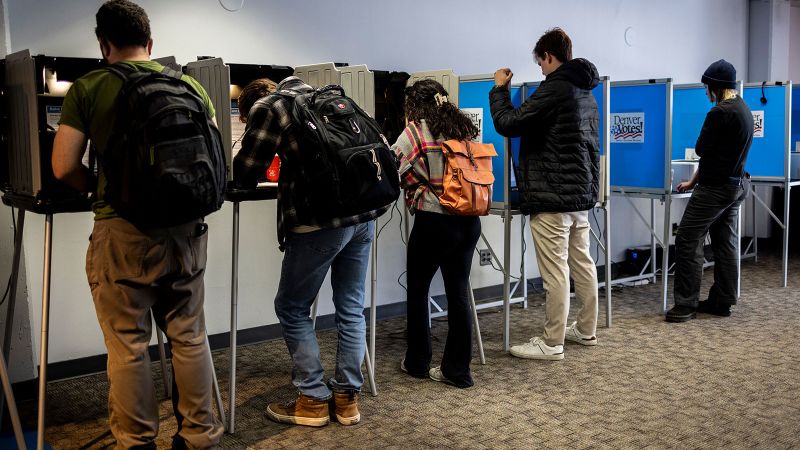**The Dynamics of Election Integrity and Political Maneuvering in the U.S.**
In recent weeks, the landscape of American election integrity has once again come under scrutiny, particularly as the 2026 midterms approach. Notably, officials in Colorado reported receiving unsolicited communications from a Republican consultant, Jeff Small, aligned with the Trump administration. His outreach focused on “election integrity,” a phrase that has increasingly become synonymous with efforts to reshape electoral processes in the U.S., particularly following the controversy surrounding the 2020 elections.
Small’s communications included references to Stephen Miller, the White House’s former deputy chief of staff, and he mentioned working with both the White House and the Department of Justice to enforce an executive order regarding elections signed by former President Donald Trump. The request Small made to election officials in Fremont and Weld counties was particularly alarming: he sought access for a third party to election equipment. This request was met with firm refusals, highlighting the heightened sensitivity among election officials regarding equipment security amid the ongoing scrutiny they face.
The endeavor in Colorado represents a broader strategy employed by Trump and his allies as they prepare for the 2026 midterm elections. These upcoming elections carry significant weight, as Democrats only need to gain three seats in the U.S. House of Representatives to reclaim control. This shift could obstruct Trump’s legislative agenda and potentially initiate investigations into his presidency during the latter part of his second term.
Samantha Tarazi, the CEO of the nonprofit Voting Rights Lab, has voiced concerns that Trump may be leveraging the power of his previous office to manipulate the electoral landscape during these midterms. Referring to Trump’s executive order as unconstitutional, Tarazi noted how it has evolved into a federal initiative aimed at asserting control over elections—a situation that has raised alarms among various stakeholders concerned about electoral integrity and the safeguarding of democratic processes.
In the aftermath of Trump’s tenure, various federal initiatives have emerged, encompassing a range of actions from voter data collection to changes in electoral rules. White House spokesperson Harrison Fields emphasized that Trump’s focus remains on ensuring election integrity, despite objections from Democrats who argue that such measures are unnecessary and counterproductive.
Concerns have intensified among election officials, particularly following incidents of unauthorized access to voting machines in states like Colorado and Georgia. Trump’s allies sought access to machinery to find evidence supporting claims of widespread voter fraud in 2020, further complicating the trust in election systems. Critics have pointed to this activity as indicative of a broader strategy to reshape electoral mechanisms to favor specific outcomes.
Recent actions from the Trump administration include signing an executive order pushing for stringent voter registration procedures, requesting voter registration records, and escalating demands for transparency from states regarding their voter lists and procedures for maintaining accurate voter rolls. Furthermore, there has been a notable push towards redistricting efforts in states like Texas under GOP control, potentially altering the political landscape to favor Republican candidates.
Election officials have expressed trepidation amidst these pressures, particularly in light of the harassment they have faced since the 2020 election. Many are concerned about the implications of being investigated for their roles in the democratic process. A survey conducted by the Brennan Center for Justice underscored this sentiment, revealing that a majority of local election officials fear political interference in their work.
Jeff Small’s outreach has not only drawn attention for its implications but also for its timing—occurring after Trump’s administration distanced itself from his actions. Moreover, Colorado officials remain acutely aware of the legality surrounding access to election equipment, especially after previous high-profile incidents involving election security breaches.
Amidst the current political maneuvering, the stakes of the 2026 midterms cannot be understated. With potentially significant ramifications on Trump’s future and that of the Democratic Party, the conflict over election integrity and the integrity of the electoral process itself continues to escalate, leaving many in the political arena and election administration questioning the future of America’s democracy.
In conclusion, as electoral dynamics evolve with significant challenges on the horizon, the intersection of integrity, politics, and governance remains a contentious battleground that is pivotal for navigating American democratic principles. With threats against election officials and ongoing disputes about voter data and the right to oversee elections, the path forward hinges on balancing security with accessibility in the voting process—an undertaking that is fraught with complexities as the nation moves closer to another critical election cycle.











